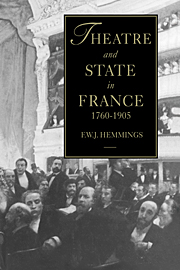Book contents
- Frontmatter
- Contents
- Chronology
- Introduction
- 1 The royal theatres of the ancien régime
- 2 The rise of the commercial theatre
- 3 Dramatic censorship down to its abolition
- 4 The liberation of the theatres
- 5 The royal theatres under the Revolution
- 6 The theatre in the service of the Republic
- 7 Re-establishment of the state theatres
- 8 Curbs on the commercial sector
- 9 Politics and the pit
- 10 The theatre in the provinces
- 11 The licensing system, 1814–1864
- 12 The state-supported theatres in the nineteenth century
- 13 The theatre in crisis: competition from the café-concert
- 14 Dramatic censorship in the nineteenth century
- 15 The private sector
- Notes
- Bibliography
- Guide to further reading
- Index
6 - The theatre in the service of the Republic
Published online by Cambridge University Press: 31 October 2009
- Frontmatter
- Contents
- Chronology
- Introduction
- 1 The royal theatres of the ancien régime
- 2 The rise of the commercial theatre
- 3 Dramatic censorship down to its abolition
- 4 The liberation of the theatres
- 5 The royal theatres under the Revolution
- 6 The theatre in the service of the Republic
- 7 Re-establishment of the state theatres
- 8 Curbs on the commercial sector
- 9 Politics and the pit
- 10 The theatre in the provinces
- 11 The licensing system, 1814–1864
- 12 The state-supported theatres in the nineteenth century
- 13 The theatre in crisis: competition from the café-concert
- 14 Dramatic censorship in the nineteenth century
- 15 The private sector
- Notes
- Bibliography
- Guide to further reading
- Index
Summary
The notion that the function of dramatic works was not primarily to move audiences or to entertain them, but rather to work for their moral improvement, was widespread among the adherents of the Enlightenment in eighteenth-century France; it underlay the thinking of Diderot, D'Alembert, Sedaine and Mercier whenever they wrote on the theatre. Mercier's complaint, already noted, that the Comédie-Française, thanks to their ‘not only nonsensical but imaginary prerogatives’, were limiting the theatrical fare available to the common people to ‘poisonous filth’, was an extreme expression of this theory. It was an idea emphasized at the start of the Revolution by the playwrights rather than by the politicians. J.-L. Laya, the future author of L'Ami des Lois, declared in a pamphlet published in 1789 that actors were ‘instruments in the hands of the moralists of a country’; and M.-J. Chénier, in the Easter address or compliment that Talma was to deliver from the stage in accordance with custom at the start of a new theatrical season (12 April 1790), stated that ‘the theatre, this powerful agent of public education, can hasten the spread of truth’. In their turn, the orators in the National Assembly lost no time in adopting and developing the idea.
- Type
- Chapter
- Information
- Theatre and State in France, 1760-1905 , pp. 92 - 100Publisher: Cambridge University PressPrint publication year: 1994



